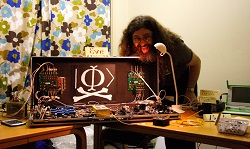 The quality of implementation of quantum key distribution plays a large role. Let us imagine bank backups, defence communication, teleportation, quantum memories of hospitals…The advent of hackers in the field has revealed many imperfections and loopholes in first-generation systems. The research and manufacturing community successfully addresses these imperfections by designing better systems and protocols, albeit this proces needs time. – I specialize my lab on security analyzes of quantum communication solutions. All the classical encryption parts have the standards certifications. What presently lacks is how we shall certify security so we hope to develop security certification standards of quantum parts of a system. The operational standards already exist- says Prof. Vadim Makarov, widely acknowledged specialist in quantum hacking, head of the Quantum Hacking Laboratory within the Institute of Quantum Computing at University of Waterloo.
The quality of implementation of quantum key distribution plays a large role. Let us imagine bank backups, defence communication, teleportation, quantum memories of hospitals…The advent of hackers in the field has revealed many imperfections and loopholes in first-generation systems. The research and manufacturing community successfully addresses these imperfections by designing better systems and protocols, albeit this proces needs time. – I specialize my lab on security analyzes of quantum communication solutions. All the classical encryption parts have the standards certifications. What presently lacks is how we shall certify security so we hope to develop security certification standards of quantum parts of a system. The operational standards already exist- says Prof. Vadim Makarov, widely acknowledged specialist in quantum hacking, head of the Quantum Hacking Laboratory within the Institute of Quantum Computing at University of Waterloo.
A systematic search for remaining security vulnerabilities is currently taking place. Is it really secure and may be widely implemented or it is still a bleeding-edge technology?
When you install a security solution, including classical parts of quantum key distribution you get a solution which is guaranteed not to be worse than all the standard security solutions. This is because quantum key distribution is implemented as an additional security layer on top of standard classical encryption and key distribution.
In which branches could quantum cryptography be applied? Banks, defence sphere, teleportation…
The available technology is ready for deployment on backbone network encryption, virtual private network encryption currently limited in a distance to about 100 km between trusted nodes. Larger distances are possible by chaining nodes, much like internet is built. Now, it is not very cheap. Right now, it addresses the market of backbone encryption and virtual private network physical encryption. In future, in principle we predict QKD not to be large or expensive. It is still a vision, but QKD will be used in all kind of applications, e.g. on mobile phones or PC. All this will become possible as the technology develops and gets miniaturized.
Thank you.
Thank you.
*** Prof. Vadim Makarov, University of Waterloo, Institute for Quantum Computing, Quantum Hacking Laboratory
Prof. Vadim Makarov, University of Waterloo, Institute for Quantum Computing, Quantum Hacking Laboratory
Prof. Vadim Makarov (born in 1974 in Leningrad, currently St. Petersburg) is a widely acknowledged specialist in quantum hacking, a discipline which aims to find loopholes in imperfect physical implementations of otherwise theoretically unconditionally secure quantum cryptographic commercial systems. He is an author of the so called blinding attack on some commercial versions of QKD systems, allowing to take control over single photon detector by appropriately blinding it with a high intensity light and thus rendering QKD procedure effectively insecure (by eavesdropping of the exchanged symmetric key).
Prof. Vadim Makarov is currently supervising investigations of other possible attack classes on different imperfect QKD physical implementations by heading the Quantum Hacking Laboratory within the Institute of Quantum Computing at University of Waterloo, and is also additionally consulting leading quantum cryptography companies in patching their QKD systems against proven attacks.
